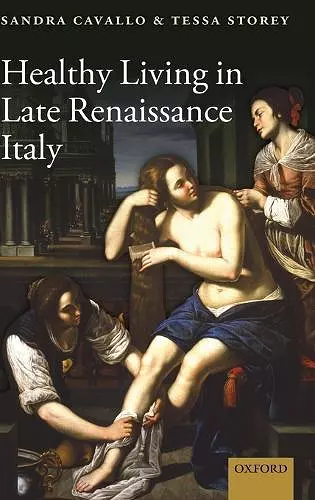Healthy Living in Late Renaissance Italy
Sandra Cavallo author Tessa Storey author
Format:Hardback
Publisher:Oxford University Press
Published:28th Nov '13
Currently unavailable, and unfortunately no date known when it will be back

Healthy Living in Late Renaissance Italy explores in detail the efforts made by men and women in late Renaissance Italy to stay healthy and prolong their lives. Drawing on a wide variety of sources - ranging from cheap healthy living guides in the vernacular to personal letters, conduct literature, household inventories, and surviving images and objects - this volume demonstrates that a sophisticated culture of prevention was being developed in sixteenth-century Italian cities. This culture sought to regulate the factors thought to influence health, and centred particularly on the home and domestic routines such as sleep patterns, food and drink consumption, forms of exercise, hygiene, control of emotions, and monitoring the air quality to which the body was exposed. Concerns about healthy living also had a substantial impact on the design of homes and the dissemination of a range of household objects. This study thus reveals the forgotten role of medical concerns in shaping everyday life and domestic material culture. However, medicine was not the sole factor responsible for these changes. The surge of interest in preventive medicine received new impetus from the development of the print industry. Moreover, it was fuelled by classical notions of wellbeing, re-proposed by humanist culture and by the new interest in geography and climates. Broader social and religious trends also played a key role; most significantly, the nexus between attention to one's health and spiritual and moral worth promoted both by new ideas of what constituted nobility and by the Counter-Reformation. Six key areas were thought to influence the balance of 'humours' within the body and Healthy Living in Late Renaissance Italy is organised into six main chapters which reflect these concerns: Air, Exercise, Sleep, Food and Drink, Managing the Emotions, and Bodily Hygiene. The volume is richly illustrated, and offers an accessible but fascinating glimpse into both the domestic lives and health preoccupations of the early modern Italians.
the book provides a fascinating and incomparably rich and nuanced contribution to our knowledge of the pursuit of health in the domestic environment, in the process instilling meaning and functionality into the everyday objects of the time. * David Gentilcore, History Today *
excellent, meticulously researched, and informative ... a terrific, scholarly book. * Douglas Biow, American Historical Review *
This book deserves a wide readership. Its imaginative research, rigorous arguments and robust engagement with scholarship will provoke the interest of specialists, and the clarity of the exposition will make it essential reading for students. * Alexandra Bamji, English Historical Review *
Healthy Living in Late Renaissance Italy addresses an important theme overlooked in recent studies of the history of Renaissance medicine, which tend to stress the demands of the marketplace and a culture of curing rather than of prevention. Cavallo and Storey's exhaustively researched book treats the reader to a wealth of fascinating details about everyday life in early modern Italy, from architecture and interior design to sport and exercise. The book makes an important contribution to our understanding of the role of the popular press in inculcating a sense of empowerment over deeply personal matters. It also reminds us of the enduring relevance of the classical tradition. * William Eamon, Bulletin of the History of Medicine *
Cavallo and Storey's important book ought to be obligatory reading for anyone interested in the history of medicine in early modern Italy. It will also generously reward other readers seeking to benefit from its bounty of illuminating insights pertaining to art history, gender studies, and social history. * Sheila Barker, CAA Reviews *
- Winner of Winner of the Roland H. Bainton Prize for History 2014.
ISBN: 9780199678136
Dimensions: 241mm x 162mm x 25mm
Weight: 764g
336 pages